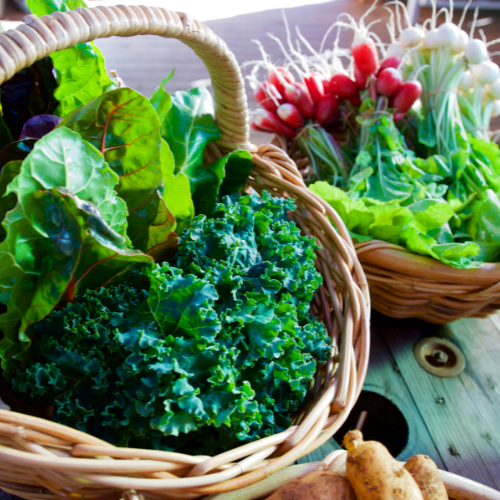Amid all the diet wars and nutritional controversies, there exists an almost unanimous consensus on the nutritional excellence of one particular food category: leafy greens. Backed by an abundance of scientific research, these greens emerge as nutritional powerhouses—dense in nutrients, low in calories—a culinary wonder that mothers worldwide have been championing for generations.
However, for many of us, the command to “eat your greens” is easier said than done.
In this article, we’re going to explore the myriad of benefits packed into those green leaves and delve into why embracing your greens is not just a childhood obligation but a gateway to wellness.
Table Of Contents:
The Nutrient Profile of Leafy Greens
The nutrient profile of leafy greens is truly remarkable, proffering an array of essential vitamins and minerals. They top the charts in vitamins A, C, and K, playing fundamental roles in vision, immunity, and blood clotting. They’re also rich in folate, which supports cell division and DNA synthesis, and loaded with iron, providing a natural boost to energy levels. Some of the best sources of potassium are leafy greens, offering a plethora of benefits for your heart.
But that's not all— leafy greens offer a complex array of phytochemicals and antioxidants, including lutein, zeaxanthin, and chlorophyll. These compounds play a protective role, shielding your cells from oxidative stress and inflammation. They’re also excellent sources of fiber, promoting healthy digestion and balancing your blood sugar.
The Health Benefits of Leafy Greens
Ready to dive into the leafy goodness of greens? It’s time to unveil the nutritional magic that makes leafy greens deserve a prime spot on your plate.
-
Supports cardiovascular health
According to the American Heart Association (AHA), leafy greens are the most beneficial fruit or vegetable for cardiovascular health.
Consuming just one cup of leafy green vegetables per day may significantly reduce the risk of heart disease, according to a 2021 study published in the European Journal of Epidemiology. Involving over 53,000 participants over 23 years, this study revealed that consuming just one cup of leafy green vegetables daily significantly lowers the risk of heart disease.
Packed with nutrients like potassium, which aids in regulating blood pressure, and magnesium, crucial for maintaining a steady heartbeat, leafy greens play a pivotal role in cardiovascular well-being. They’re also a rich source of vitamin K, which helps protect your arteries and promote proper blood clotting, as well as dietary nitrates, which have been shown to reduce blood pressure, decrease arterial stiffness, and enhance the function of cells lining the blood vessels.
Furthermore, the abundant presence of antioxidants in leafy greens, such as vitamins A and C, serves as a shield against oxidative stress and inflammation, both big guns in cardiovascular diseases. 
-
Aids weight management and satiety
Leafy greens are also champions in the realm of weight management and satiety. These low-calorie, high-volume foods are rich in fiber, which not only aids digestion but also provides a feeling of fullness. The high-water content in leafy greens contributes to their volume without a surplus of calories, making them an excellent choice for those looking to maintain or lose weight. Additionally, the fiber in leafy greens slows down the digestion and absorption of nutrients, promoting stable blood sugar levels and preventing sudden spikes that can lead to cravings.
So before you go keto, why not take the first step of eating more leafy greens?
-
Supports detoxification
One of the best-known benefits of leafy greens is their ability to support the body’s natural detox pathways.
Chlorophyll, which is responsible for their green color, has been shown to bind to and neutralize toxins, aiding in their elimination from the body. It is also a potent antioxidant that helps fight free radical damage to cells.
Leafy greens are also abundant in other antioxidants like vitamin C, beta-carotene, and flavonoids. These compounds help neutralize free radicals and reduce oxidative stress, which is essential for supporting the liver's detoxification functions.
The high fiber content in leafy greens promotes regular bowel movements, facilitating the removal of waste and toxins from the digestive tract, and preventing their reabsorption in the intestines.
Leafy greens also provide essential vitamins and minerals that are required for the proper functioning of enzymes involved in detoxification processes. Nutrients like folate, vitamin K, and manganese contribute to optimal enzyme activity.
-
Reduces inflammation
Leafy greens are also potent allies in the battle against inflammation. Rich in antioxidants, such as vitamins A and C, they play a crucial role in neutralizing free radicals and mitigating oxidative stress, a key driver of inflammation.
The potent anti-inflammatory effects of leafy greens can also be attributed to their diverse array of phytochemicals such as quercetin and kaempferol. These compounds have been shown to modulate inflammatory pathways and curb the production of pro-inflammatory molecules. The presence of chlorophyll, the green pigment in these vegetables, has also been linked to anti-inflammatory effects due to its ability to suppress certain inflammatory markers.
-
Provides support for bone health
Leafy greens also wield an arsenal of nutrients crucial for bone health. These greens, rich in vitamin K, play a pivotal role in bone metabolism, supporting the synthesis of osteocalcin—a protein essential for bone mineralization. Leafy greens also offer a respectable dose of calcium and magnesium, two minerals integral to the structural integrity of bones.
Furthermore, leafy greens are rich in vitamin C which supports collagen formation, contributing to the structural integrity of bones, as well as potassium which helps to prevent bone loss by offsetting the acid load in the body.
-
Supports healthy immune function
Green leafy vegetables are among the most powerful immune-supporting foods for a number of different reasons.
Dark, leafy green vegetables such as kale, collard greens, mustard greens, broccoli, bok-choy, and Brussel sprouts (also known as cruciferous vegetables) are packed with phytonutrients that provide important chemical signals that encourage immune cells in the gut known as intraepithelial lymphocytes (IELs) to function properly. IELs reside within the intestinal lining and act as part of the first line of defense for your immune system. They play a critical role in safeguarding the integrity of the barrier and bacterial composition- both of which are super important for keeping your immune system in top shape.
They’re also rich in antioxidants and other nutrients essential for immune function such as folate and calcium. Folate is especially vital for producing antibodies that work to destroy antigens that can cause illness. 
-
Fights against cancer
Studies have linked increased consumption of green leafy cruciferous vegetables with a decrease in rates of breast, lung, colorectal, bladder and prostate cancers.
Cruciferous vegetables contain the potent anti-cancer compound sulforaphane as well as the antioxidants isothiocyanate and glucosinolate which have been shown to detoxify and remove carcinogens, prevent tumors from growing and stimulate apoptosis in which cancer cells self-destruct. Glucosinolates can also reduce inflammation, inhibit enzymes that activate carcinogens and stimulate enzymes that deactivate carcinogens. Green leafy vegetables also contain two powerful antioxidants, lutein and zeaxanthin, which have the ability to block early cancer development.
-
Supports brain health
Leafy greens are also a smart choice for supporting brain health.
A research study discovered that individuals who incorporated a higher daily intake of leafy greens experienced slower rates of cognitive decline compared to those with lower consumption. Remarkably, those who regularly consumed leafy greens exhibited a memory performance equivalent to individuals 11 years younger, and this effect persisted even after adjusting for various factors like lifestyle, education, and overall health.
Leafy greens, particularly spinach, broccoli, and lettuce, are also rich in folate which plays a crucial role in stimulating the production of essential neurotransmitters and facilitating the transmission of messages from the brain to the rest of the body. Last but not least, their antioxidants help to combat oxidative stress and inflammation, both of which are linked to cognitive decline.
Eat Your Greens!
Leafy greens are not just salad staples; they are a diverse and vibrant world of flavors, textures, and unparalleled nutritional benefits. Beyond their culinary appeal, these greens offer multifaceted advantages, ranging from promoting cardiovascular health and aiding in weight management to being potent allies in the body's detoxification processes. Whether you prefer kale, spinach, or romaine, these greens deserve a prime place on your plate.
Recipe Spotlight: Glowing Green Smoothie Bowl
A delightful concoction that brings together an array of wholesome and nutrient-packed ingredients. Packed with vibrant flavors and nourishing goodness, this smoothie is sure to kickstart your day with a burst of energy and keep you feeling refreshed and revitalized. Enjoy!
















What Do You Think? Comment Below: